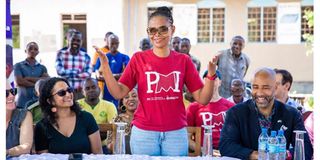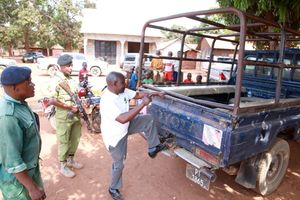Naomi Serbantez - A woman who has championed malaria drop in Tanzania

Naomi Serbantez - PMI Resident Advisor and Malaria Team Lead at USAID/Tanzania speaks after inspecting the distribution of Insecticide Treated Net (ITN) exercise in Bagamoyo District.
What you need to know:
- She is the first Tanzanian to hold the position of USAID - President’s Malaria Initiatives (PMI) (Resident Advisor and Malaria Team Lead)
Dar es Salaam. As the US President’s Malaria Initiative’s (PMI) USAID Resident Advisor and Malaria Team Lead, Naomi Serbantez leads the second largest global PMI program with programming at $44 million per year whereby she over sees how the funds are spent in fighting malaria in the country.
She is the first Tanzanian to hold the position of USAID - President’s Malaria Initiatives (PMI) - (Resident Advisor and Malaria Team Lead), Serbantez says the appointment is a significant milestone both personally and for the public health profession.
‘It recognizes my expertise, dedication, and contributions to malaria control and public health, validating the hard work and commitment I have invested in combating malaria and improving health outcomes in Tanzania’ she says.
Serbantez adds, ‘Representing my country at such a high level is a source of immense pride, and I hope my achievement will inspire other Tanzanians, especially young professionals, to pursue careers in public health and strive for excellence. This role brings a great responsibility to lead and positively impact malaria control efforts.
It also provides an opportunity to bring local insights and perspectives to PMI's strategies, ensuring they are effectively tailored to the Tanzanian context’.
She continues to say that her appointment demonstrates the growing recognition of the capabilities and potential of local health professionals. It highlights the importance of involving local expertise in leadership positions to address health challenges more effectively. This milestone underscores the value of investing in professional development for health workers, encouraging more initiatives aimed at enhancing the skills and knowledge of local professionals in the public health sector.
Having a Tanzanian in this role strengthens partnerships between local and international stakeholders, enhancing collaboration, ensuring better alignment with national priorities, and fostering a more inclusive approach to malaria control and public health initiatives. This achievement serves as a role model for aspiring public health professionals, demonstrating that with dedication, hard work, and the right opportunities, they can attain leadership positions and contribute significantly to their field.
‘With a local perspective in a key advisory role, there is potential for more culturally and contextually appropriate interventions, leading to more effective strategies and a greater impact on malaria control efforts. As a woman in leadership, this appointment adds to the diversity of leadership in global health initiatives, highlighting the importance of representation and inclusivity in tackling global health challenges. It reflects global recognition of the progress and potential in Tanzania's public health sector, potentially attracting more attention and resources to support ongoing and future health initiatives in the country’ she says.
‘Overall, this milestone is a testimony to the progress in public health in Tanzania and the value of local leadership in global health initiatives. It signifies a step forward in achieving more effective and sustainable health outcomes through inclusive and collaborative effort’ Serbantez says.





